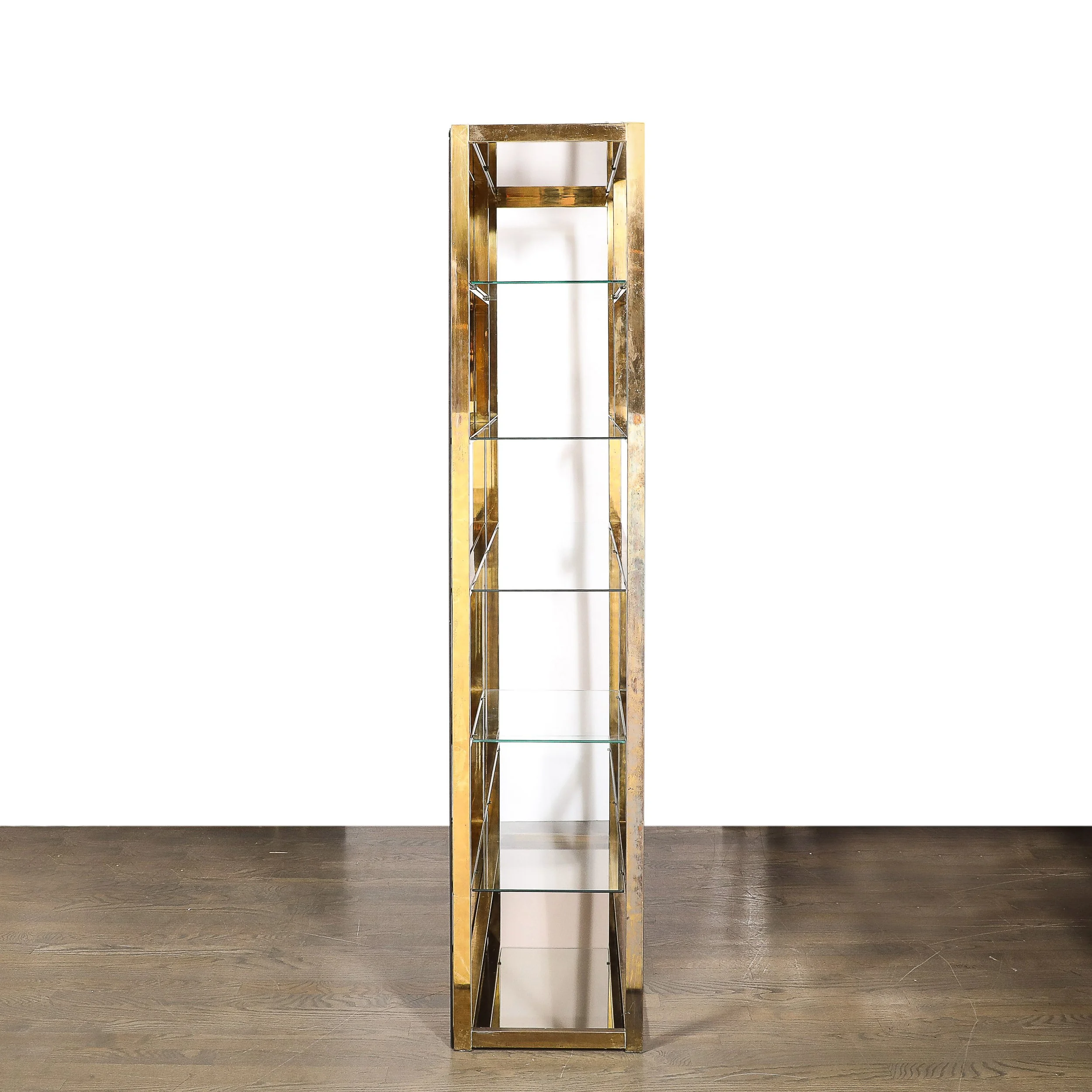Mid-Century Modernist Brass, Glass and Bronzed Mirror Étagère by Milo Baughman













Mid-Century Modernist Brass, Glass and Bronzed Mirror Étagère by Milo Baughman
This sleek and well composed Mid-Century Modernist Étagère in Brass, Glass and Bronzed Mirror by Milo Baughman originates from the United States, Circa 1970. Features a patinated brass framework in rectangular elements that are joined at unique intervals to create a dynamic and highly functional series of shelves to store and display accessories and items of one's choosing. Behind the transparent glass shelves and brass frame rests a panel of bronze mirror, beautifully reflecting the environment surrounding the piece as well as the items displayed on the shelving. The bronze hue pairs brilliantly with the patinated brass of the framework, cohesive and highly elegant. Made by the esteemed designer Milo Baughman, known for his use of geometric compositions and elegant metals with creative and artistic expression using minimal forms. This piece exemplifies many of the characteristics and motifs of Mid-Century Modernist design, and will style brilliantly in a wide array of spaces and settings, from Mid-Century Modernist to Contemporary and Minimal Interiors. In Good Vintage Condition.
American, Circa 1970
Dimensions:
Height: 79.5 in (201.93 cm) x Width: 42 in (106.68 cm) x Depth: 16.25 in (41.28 cm)
Creator: Milo Baughman (Maker)
Style: Mid-Century Modern (Of the Period)
Materials and Techniques: Brass, Bronze, Glass, Mirror
Place of Origin: United States
Period: 1970-1979
Date of Manufacture: circa 1970
Condition: Excellent. Wear consistent with age and use.
Reference Number: LU793439663552
MILO BAUGHMAN
Milo Ray Baughman, Jr. (1923-2003) was a towering figure in American modern furniture design, renowned for his innovative and accessible creations. Born in Kansas and raised in Long Beach, California, Baughman's early exposure to design began at age 13 when he helped design his family's home. His ambitions in architecture were interrupted by World War II, during which he served four years in the Army Air Forces, spending part of that time designing officers’ clubs.
Post-war, Baughman returned to California to study product and architectural design at the Art Center School of Los Angeles and Chouinard Art Institute, now known as the California Institute of the Arts. His career in design began at Frank Brothers in Long Beach, where he created window displays and custom furniture, quickly establishing himself in the emerging modern furniture movement.
In 1947, Baughman launched Milo Baughman Design Inc. in Los Angeles, becoming a pivotal figure in the West Coast’s modernist movement. He became known for his use of novel materials and modern manufacturing techniques. Throughout his career, Baughman collaborated with numerous furniture companies, most notably with Thayer Coggin, Inc., beginning a partnership in 1953 that would last fifty years.
Baughman’s designs, such as his famed “Skyscraper” bookcases, “Speed” chairs, and “Propeller” chair, were emblematic of a style that was both modern and accessible, marrying functionality with the aesthetic principles of modernism. His work was characterized by clean lines, organic forms, and a democratic approach to beauty, making modern design available to a broader audience.
His influence extended beyond design to writing, teaching, and lecturing about modern American design's positive impacts on living standards. Baughman’s commitment to quality and modernism earned him a place in the Furniture Designer’s Hall of Fame in 1987. His work is celebrated in museums and in homes across America and remains influential in the design community. Baughman left behind a legacy of innovation when he died in 2003, just weeks before his long-time collaborator Thayer Coggin. His designs continue to inspire contemporary furniture designers, maintaining his place as a central figure in modern American furniture design.
